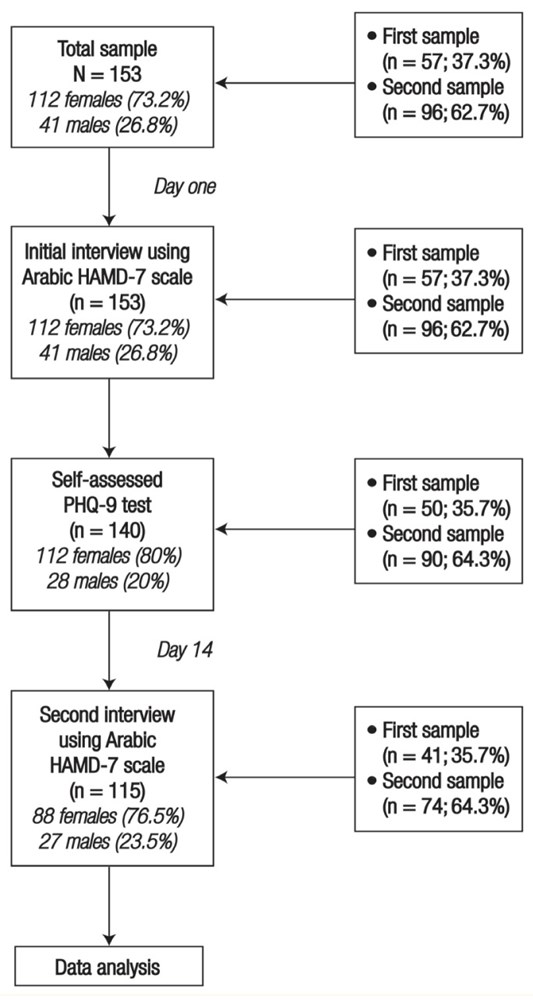Arabic Translation, Validation and Cultural Adaptation of the 7-Item Hamilton Depression Rating Scale in Two Community Samples
Affiliations
Affiliations
- Department of Psychiatry, King Saud University, Riyadh, Saudi Arabia.
- College of Medicine, Al-Imam University, Riyadh, Saudi Arabia.
- College of Medicine, Taibah University, Madinah, Saudi Arabia.
- Department of Psychiatry, Faculty of Medicine, Kuwait University, Kuwait.
- Department of Psychiatry, Faculty of Medicine, University of Toronto, Toronto, Ontario, Canada.
Abstract
Objectives: Depression is a common mental disorder, the severity of which is frequently assessed via interview-based clinical scales such as the 7-item Hamilton Depression Rating Scale (HAMD-7). The current study aimed to translate and examine the validity of an Arabic version of the HAMD-7 scale.
Methods: This study took place between February and March 2016 in the Psychiatry Department of King Saud University, Riyadh, Saudi Arabia. The HAMD-7 scale was translated into Arabic using forward and backward translation methods. A total of 153 Arabic speakers were recruited to test the translated scale, including 57 medical students and 96 members of the general public. The Arabic version of the HAMD-7 scale was completed by trained investigators during face-to-face interviews with the participants. In order to assess convergent validity, participants also completed an Arabic version of the self-assessed Patient Health Questionnaire-9 (PHQ-9) scale. Subsequently, the test-retest reliability of the translated HAMD-7 scale was evaluated two weeks later during a second interview.
Results: Overall, HAMD-7 scores were positively correlated with PHQ-9 scores (r = 0.633-0.749). Moreover, the translated HAMD-7 scale proved to be reliable in terms of test-retest reliability (intra-class correlation coefficient: 0.807; P <0.001). With regards to internal consistency, the Cronbach's α values ranged between 0.607-0.756.
Conclusion: The Arabic HAMD-7 scale was found to be reliable and valid among two samples of Arabic speakers in Saudi Arabia. However, further research among Arab-speaking patients diagnosed with depression is needed in order to establish its usefulness in assessing the severity of depressive symptoms.
Keywords: Depression; Psychiatry; Psychometrics; Questionnaire Design; Saudi Arabia; Translation; Validity and Reliability.
Conflict of interest statement
CONFLICT OF INTEREST The authors declare no conflicts of interest.
Figures
Similar articles
Mansour M, Hasan AA, Alafafsheh A.PLoS One. 2021 Aug 12;16(8):e0255159. doi: 10.1371/journal.pone.0255159. eCollection 2021.PMID: 34383801 Free PMC article.
Alabdulaziz H, Alquwez N, Cruz JP, Tumala R, Albougami A, Albloushi M.Int J Nurs Pract. 2021 Jun;27(3):e12843. doi: 10.1111/ijn.12843. Epub 2020 May 3.PMID: 32363658
Shilbayeh SAR, Ibrahim AA.Health Qual Life Outcomes. 2020 Jul 6;18(1):215. doi: 10.1186/s12955-020-01471-4.PMID: 32631346 Free PMC article.
Adaptation and Validation of the Arabic Version of the Mindfulness Inventory for Sport.
Ben Salha M, Kern L, Abdelatif F, Nabli EH, Baria A, Fournier JF.Percept Mot Skills. 2022 Dec;129(6):1838-1852. doi: 10.1177/00315125221127513. Epub 2022 Sep 17.PMID: 36120862 Review.
Aloudah NM.Explor Res Clin Soc Pharm. 2022 Jun 24;6:100153. doi: 10.1016/j.rcsop.2022.100153. eCollection 2022 Jun.PMID: 35800471 Free PMC article. Review.
Cited by
Obeid S, Azzi V, Hallit S.PLoS One. 2023 May 18;18(5):e0285665. doi: 10.1371/journal.pone.0285665. eCollection 2023.PMID: 37200339 Free PMC article.
Altered Spinal Excitability in Patients with Primary Fibromyalgia: A Case-Control Study.
Thabit MN, Ezat A, Ismael MA, Hadad S.J Clin Neurol. 2021 Jan;17(1):121-127. doi: 10.3988/jcn.2021.17.1.121.PMID: 33480207 Free PMC article.
